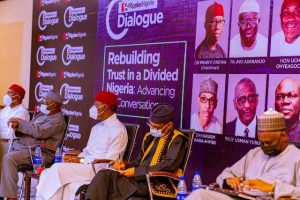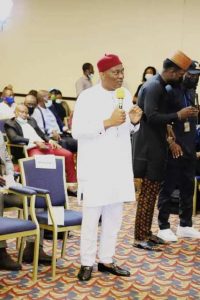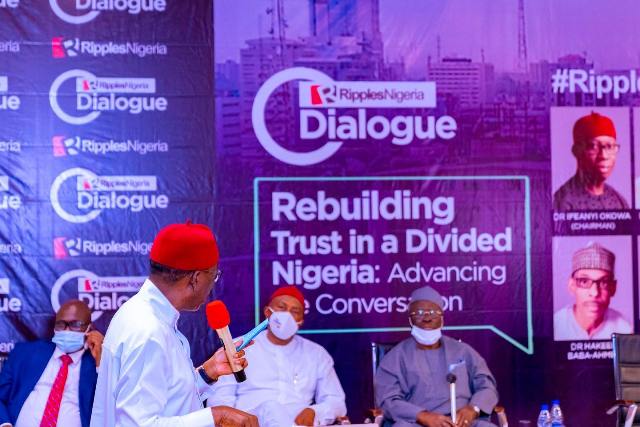Delta Governor, Sen. (Dr) Ifeanyi Okowa, on Wednesday, said bad governance, ethno-religious conflicts and lack of faith in electoral process were major causes of disunity in Nigeria.
Okowa stated this in his keynote address at the 2021 Annual Lecture and Symposium organised by Ripples Centre for Data and Investigative Journalism (RCDIJ) at Sheraton Hotel, Ikeja, Lagos.
The theme of the Dialogue is “Rebuilding Trust in a Divided Nigeria: Advancing the Conversation’’
The governor stated that bad governance at different levels of government was a major contributory factor to disunity in the country, adding that absence of a shared national vision or aspiration, primordial loyalties and sentiments largely held sway among the citizenry.

He listed indices of bad governance to include tribalism and nepotism, lopsidedness in power sharing, corruption and lack of transparency and accountability, religious bigotry, insecurity, unemployment and poverty.
Okowa called on the National Assembly to take steps in bequeathing to Nigerians a true Constitution that would provide for the overall interests of Nigerians.
“It is not a secret that during elections most people vote along sectional lines, be it religion or ethnicity. Even the war against corruption is subjected to all manner of scrutiny based on our ethnic affiliations and religious persuasions.
“The sad reality is that we seem to derive more comfort, protection and security from our ethnic identity. The concept of one Nigeria is still just that – a concept.
“Another factor responsible for our current disunity is the lack of political will to devise a constitution that supports true federalism.

“The 1999 Constitution (as amended) centralizes political and economic powers in the Federal Government and emasculates the States by denying them powers to secure their own territories and control their natural resources for the development of their territories and people.
“A situation where the Federal Government takes 52.68 per cent, the 36 States and 774 local government areas that carry most of the burden of development get 26.72 per cent and 20.60 per cent, respectively, does not augur well for effective grassroots development, inclusive economic growth and social cohesion,” he said.
According to the governor, another cause of disunity in Nigeria is the current lack of faith in the electoral process by the electorate, resulting in the massive apathy and self-disenfranchisement prevalent during elections.
“The people feel that their votes do not count and have, therefore, sunk into disillusionment, resentment and resignation.
“To restore faith in the electoral process, there should be stiff penalties for electoral violence and other malpractices, regardless of which party is culpable.
“Election results should also be transmitted electronically at the point of counting the votes at the poling units to remove the opportunities for later alterations of figures.
“It goes without saying that the refusal by the National Assembly to include a mandatory electronic transmission of election results in the Electoral Act has deepened the distrust that the public has for politicians and the ruling class,” he said.
He averred that governance system at all levels, particularly at the federal level, must be just, fair, equitable and seen to be inclusive, adding that Nigeria could only grow if ethnic, religious and tribal divides dissolve and a pan-Nigeria goal truly desired and pursued by all.
Okowa urged the Federal Government to muster the political will and deal decisively with criminals, regardless of their ethnic groups, religions or status.
“The Federal Government should frontally and transparently tackle insurgency, banditry, kidnapping, criminal herdsmen operations and all purveyors of insecurity in a way to obviate the popular impression that they are executors of a pre-planned genocide,” he stated.
Earlier, Executive Director of RCDIJ, Mr Samuel Ibemere, while welcoming guests to the event, said that the theme of the Dialogue was apt in view of the current crisis bedeviling the country and threatening the nation’s unity.
He said that poor leadership was central for the malaise facing the country, adding that Ripples Nigeria had in the last six years contributed immensely to advancing the course of unity and stability of the nation.
Other speakers at the event were Afenifere Leader, Pa Ayo Adebanjo; Northern Elders Forum Spokesman, Dr Hakeem Baba-Ahmed; former House of Representatives member, Hon. Uche Onyeagocha; and former Executive Secretary of National Health Insurance Scheme (NHIS), Prof. Usman Yusuf.
In attendance was the Minority Leader of the House of Representatives, Rt. Hon. Ndudi Elumelu and some other dignitaries.









